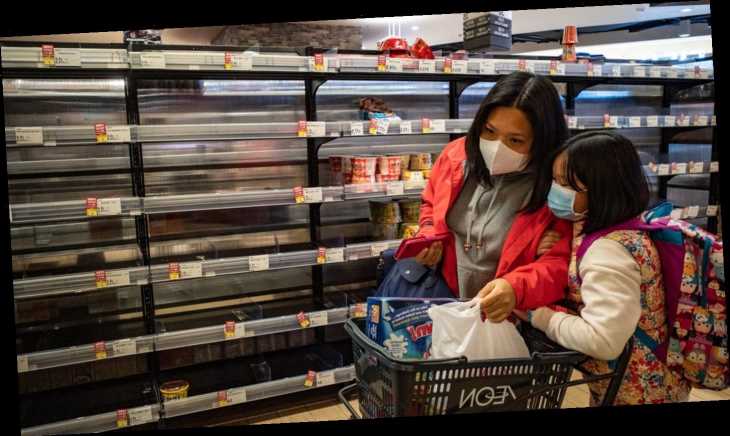NANJING, China — A barista in one of the few Starbucks in this city northwest of Shanghai that is still open had a stern message Friday for one customer: “Get out.”
The reason? The man was not wearing a mask.
After a brief argument, the interloper finished eating and left. The barista sprayed down the immediate area with disinfectant and scrubbed the table, chair and floor for several minutes.
Like many Chinese cities, as the deadly coronavirus sweeps the country, Nanjing has stepped up efforts to control its spread.
This provincial capital of Jiangsu province, with a population of 8.3 million, is not one of the cities facing the most serious problems. It reports only 25 cases, unlike Wenzhou, a coastal city in neighboring Zhejiang province, which has 227. But the barista’s reaction reflects the heightened state of anxiety and vigilance in many cities in eastern China and across the country.
WHO declares coronavirus global emergency: State Department raises travel warning to highest level
‘I’m still wearing my mask’: American evacuated from China still fears deadly coronavirus
Since the virus erupted in December in Wuhan, a provincial capital of 11 million people in central China, it has spread quickly. It broke out just as Chinese citizens took to train stations and airports to return to their ancestral hometowns to celebrate Spring Festival, the Chinese New Year.
In barely 10 days, the number of confirmed cases has jumped from fewer than 300 to nearly 10,000, claiming more than 200 lives.
Customers, wary of the spreading coronavirus, wear face masks as they walk past empty shelves in a grocery store on January 31, 2020 in Hong Kong. (Photo: Anthony Kwan, Getty Images)
Although people using public transportation and entering public spaces in Nanjing are, as in most cities, required to wear face masks, the protective gear is hard to come by. Most pharmacies and convenience stores are sold out. Even Jiangsu Province People’s Provincial Hospital, in the city’s Gulou district, issued a press release and called for donations.
Chinese police wear protective masks as they stand guard on a main road on January 31, 2020 in Beijing, China. (Photo: Kevin Frayer, Getty Images)
Some locals stored up masks ahead of time.
Wang Xinyan, a local magazine editor, said she and her husband canceled a trip to Jinzhou, 140 miles west of Wuhan, to celebrate Spring Festival with her husband’s family after hearing from friends and relatives in the province. Instead, they reserved 200 masks from pharmacies and offered their extra masks to friends.
Tips: How to stay healthy on a plane as coronavirus, flu, colds raise travel concerns
‘Everything now is experimental’: Here’s how doctors are treating coronavirus
Others have relied on overseas buyers, called dai gou. Tan Chao, a hotel manager in Zhuzhou, a city of 3.9 million in Hunan province, 250 miles south of Wuhan, bought 50 masks from Japan for her employees.
For now, most people are simply staying home. Although Zhu Fangfang, a resident of Wenzhou, only has a few masks left, she said, “I don’t go out often, so I don’t use them very quickly.”
Not that there is much to do outside the house.
Nanjing, which served as the capital during the Ming Dynasty and the Republic of China from 1927 to 1949, is full of museums and historic sites. All closed on Jan. 24, Lunar New Year’s eve. Shopping malls were also shuttered as they were elsewhere in China because of the health crisis.
A sign on the locked doors of Huacai Tiandi mall in the Jianye district of southern Nanjing was succinct: “In order to ensure your health, Huacai Tiandi will close all shops from January 30 through February 8, and will return to ordinary operations on February 9.”
Spring Festival is normally a quiet time in major cities, with everyday dumpling restaurants, mahjong parlors and other small businesses closed for the holiday. But now IST mall in Xuanwu district and 1912, a popular bar and restaurant street next to the former Presidential Palace, are also closed.
Grocery stores, fresh fruit markets, pharmacies and some international chains remain open, but there are shortages of fruits and vegetables in the afternoons at some markets.
People in Nanjing are trying to adjust. To “shoot two birds with one arrow,” as a Chinese phrase goes, Jinhuifu, a banquet restaurant in Xuanwu district, began selling its own unused food outside the front door.
Li Youcun, a manager and chief, said the restaurant closed because people did not want to eat together due to the virus. “We planned to prepare this food for our customers. Now we are selling it,” Li said.
A bright spot for Nanjing residents is the the Deji Plaza in Xinjiekou, one of the highest grossing luxury shopping malls in the country. But doors close at 6 p.m. — and all shoppers must have their temperature checked before entering.
Source: Read Full Article
